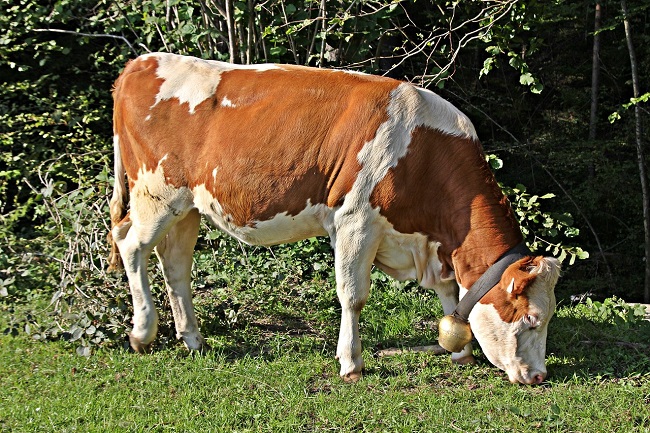Understanding the Weight of a Cow isn’t as simple as providing a single number. In fact, a Cow’s Weight can vary greatly, depending on the breed, age, sex, and even its purpose, whether it’s for beef or dairy production.
This article aims to provide an in-depth look at how much a Cow weighs, taking into account the different variables involved.

Average Weights of Different Types of Cows
Here is the guide to the average Weight of Cow:
Read Also:
Calf Weight
Calves are typically born weighing between 60 to 100 pounds, depending on the breed. As they grow, their Weight rapidly increases. By the time a calf is weaned, usually around six months old, they can weigh anywhere from 450 to 700 pounds.
Beef Cow Weight
Beef Cows are usually heavier than their dairy counterparts. Adult beef Cows can weigh anywhere from 1,000 to 2,000 pounds. The heaviest beef breed, the Chianina, can reach a staggering Weight of over 3,000 pounds.
Dairy Cow Weight
Dairy Cows, although generally lighter than beef Cows, can still reach significant Weights. The average adult dairy Cow, such as a Holstein, can weigh between 1,200 to 1,500 pounds. However, smaller dairy breeds, like the Jersey Cow, average between 800 to 1,200 pounds.
Factors That Impact a Cow’s Weight
Understanding the average Weight of Cows requires an appreciation for the factors that can significantly influence their Weight.
Breed
Different breeds have different average Weights. For instance, the Angus beef Cow tends to weigh between 1,000 to 1,800 pounds, while a Hereford beef Cow can reach 1,200 to 2,500 pounds. Among dairy breeds, Holsteins are typically heavier, while Jerseys are among the lightest.
Age and Sex
Like any living organism, a Cow’s Weight varies as it grows and matures. Younger Cows, or heifers, tend to be lighter, with their Weight increasing until they reach maturity at around four years old. Additionally, male Cows, or bulls, are generally heavier than females.
Health and Nutrition
A Cow’s health status and nutrition significantly affect its Weight. Cows that receive sufficient high-quality feed and are free from disease or parasites will generally weigh more than those that don’t.
Purpose
Whether a Cow is raised for beef or milk production also impacts its Weight. Beef Cows are generally bred and raised for size and muscle mass, making them heavier. On the other hand, dairy Cows are selected for their milk-producing abilities, often resulting in a leaner body mass and lighter Weight.
Climate Influence on Cow’s Weight
Interestingly, the climate and weather conditions where a Cow lives can impact its Weight. Cows that live in colder climates tend to have more body fat and overall Weight to help them withstand the low temperatures.
On the contrary, Cows in warmer climates may weigh less due to having a leaner body composition for better heat tolerance.
The Importance of Weight Management in Cows
Maintaining a healthy Weight in Cows is crucial for various reasons. For dairy Cows, proper Weight management is key to ensuring optimal milk production. UnderWeight Cows may not produce as much milk, while overWeight Cows can face health issues that also limit their milk production.
For beef Cows, their Weight is directly tied to their market value as more Weight generally means more beef. However, it’s essential to find a balance since overWeight Cows may be prone to health issues, which could decrease their overall value.
Weighing Cows: A Crucial Task in Livestock Management
Knowing how much a Cow weighs is a crucial part of livestock management. Regularly monitoring a Cow’s Weight can help track its growth, ensure it is receiving the right amount of feed, and detect potential health problems early.
There are various methods to weigh Cows, from traditional cattle scales to modern technological solutions like Weight bands and electronic weighing systems.
The Role of Genetics in Determining Cow’s Weight
Genetics plays a significant role in determining a Cow’s Weight. Specific genes control the size and Weight of cattle.
Through selective breeding, farmers can breed Cows with desirable traits, such as larger size in beef cattle or optimal Weight for maximum milk production in dairy Cows. This genetic selection has led to the various breeds we see today, each with its own range of Weights.
Read Also:
Conclusion
From newborn calves to full-grown beef and dairy Cows, the Weights can vary greatly. Factors such as breed, age, sex, health, nutrition, and purpose can all impact how much a Cow weighs.
Understanding these factors not only helps provide a more accurate answer to “how much does a Cow weigh?” but also helps us make informed decisions in agriculture, animal health, and food production.
Remember, the Weight of a Cow doesn’t just offer insight into its growth and health. It also reflects the care and dedication of farmers and the industry towards ensuring the welfare of these essential animals in our global ecosystem.
























